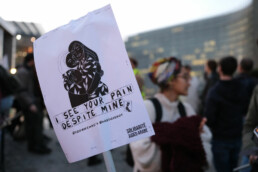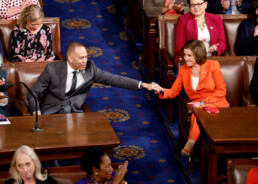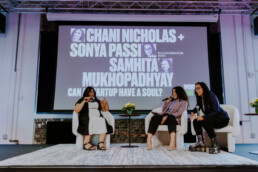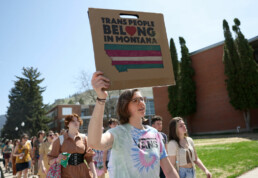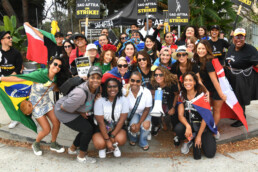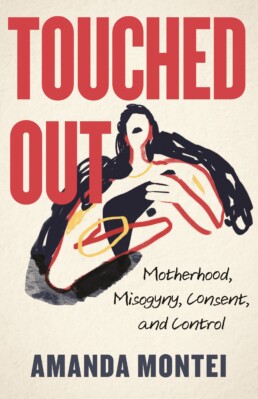Learning from post-9/11 America
|
Dear Meteor readers, Have you looked at the foliage lately? In my continuing effort to force everyone to take a moment for their mental health, I want to remind you that trees are great. Here are my favorite ones:  A SECTION OF WOODS I FREQUENT TO DO PRIMAL SCREAMING. In today’s newsletter, we take a look at the ways in which we are and aren’t allowed to talk about Palestine and Israel, marvel at the work of Icelandic people, and share some fun listening. Tree huggin’, Shannon Melero  WHAT'S GOING ONSilent or silenced?: It’s been less than three weeks since Hamas’s deadly attack on Israeli civilians, which set off what has now turned into what UN human-rights experts have described as “crimes against humanity” in Gaza. The situation on the ground is devastating, and has triggered a crisis in the public conversation—a space that has long restricted how to talk about Israel and Palestine. And we’re already seeing what happens to those who choose to speak out about the crisis in Gaza. Yesterday, Michael Eisen was fired from his job as editor-in-chief of biomedical journal eLife after retweeting a headline from The Onion that read, “Dying Gazans Criticized For Not Using Dying Breaths To Condemn Hamas.” Eisen, a Jewish man with family in Israel, tweeted that he admired The Onion’s recognition of the imbalanced attention to the lives of Israeli and Palestinian victims. After much criticism, he wrote a follow-up tweet adding that he was horrified both by what Hamas did and the collective punishment of Gazans. Nonetheless, he’s now unemployed. This isn’t an isolated incident. Maha Dakhil, a talent agent at CAA, was forced to leave her leadership roles after she reshared an Instagram story that read in part, “What’s more heartbreaking than witnessing genocide? Witnessing the denial that genocide is happening.” Yesterday, 92NY, a storied Jewish cultural center in New York City, halted its prestigious literary series after the public outcry about their decision to cancel a reading by Pulitzer Prize-winning novelist Viet Thanh Nguyen because of his criticism of Israel’s military action in Gaza. “I hope there is a moral consensus that killing civilians is wrong, whether Hamas does it or whether Israel does it,” he wrote on Instagram. If all of this sounds eerily familiar, then congratulations, you’ve lived long enough to remember what it was like in the weeks after 9/11. Then as now, Americans were compelled to take a stance: Either you were for revenge at any cost, or you were against America. Even as a sixth grader, I was so influenced by pro-war propaganda that I started to believe Muslims were scary warmongers trying to kill my mom, who worked in the sure-to-be-targeted Chrysler building. (Allah laughed hysterically when I converted to Islam some years later.) Such limited, binary thinking wasn’t just for sixth-graders, alas. Politicians, news outlets, and religious leaders demanded patriotism and support for the wars through strategic censorship and pressure. People who spoke out too early against the U.S.’s military response were swiftly condemned. Susan Sontag was labeled an “America-hater,” a “moral idiot,” and a “traitor” for pointing out America’s actions before the attacks in a brief essay in the New Yorker. Rep. Barbara Lee, who had the courage and the foresight to be the only member of Congress to vote against invading Afghanistan, received death threats and hate mail in response. On the day she cast her vote, she quoted a preacher who spoke at the National Cathedral three days after 9/11: “Let us also pray for divine wisdom…that as we act we not become the evil we deplore.” Twenty years later, the majority of the country agreed with her. Now, as a humanitarian crisis plays out before our eyes, we must look at it through the hard-earned lens of hindsight. As we all figure out how to publicly react and privately debate, we should take with us the words of Sontag in that prescient New Yorker piece: “Let’s by all means grieve together. But let’s not be stupid together. A few shreds of historical awareness might help us understand what has just happened, and what may continue to happen.” AND:
 VOLUME ON HIGH 🎧

 FOLLOW THE METEOR Thank you for reading The Meteor! Subscribe using their unique share code or snag your own copy, sent Tuesdays and Thursdays.
|
![]()
Remember when we had a House Speaker?
|
Hey Meteor readers, A core practice of my faith is something my mom calls “standing in the pit.” It’s the idea that if someone close to you is suffering, you must stand beside them in that moment. This week, I was in the pit with a dear friend and Palestinian activist who was berating herself for not carrying out her normal duties. “I haven't cooked dinner for my family,” she texted me. I offer you the same advice I offered her: It is okay to stop for a moment and take care of yourself. Simply sitting alone for five minutes, or even using the bathroom without your phone, can make a difference. You deserve that time. In today’s newsletter, we check in on what’s happening in the House, discover a frightening new domestic violence statistic, and share what we’ve been watching to quiet our minds. In the pit beside you, Shannon Melero  WHAT'S GOING ONI bet you think about me (Nancy Pelosi’s version): The House of Representatives has now gone more than two weeks without a speaker, and it’s unclear at this point who will muster enough votes for the job. What is becoming clear is how much Nancy Pelosi’s coworkers miss serving under her—even the ones from across the aisle. In the wake of Rep. Kevin McCarthy’s ouster, Republican Rep. Tim Burchett told The Daily, “I catch a lot of hell for saying this, but she was an effective leader.” Rep. Pelosi, for her part, isn’t mincing words: “I feel sad for the institution,” she told reporters after Rep. Jim Jordan’s first failed vote. “I think it’s sad that they’re getting worse and worse.” While the House chaos might seem like a petty Washington squabble, we’re actually in the middle of a historic moment. This is the longest the House has ever been speakerless, and it couldn't be happening at a more inconvenient time. Without a speaker, the House is unable to vote on any legislation or funding measures—like this hospital pricing bill that was ready to be brought to the floor the same week McCarthy was voted out. It’s not the same: While the House twiddled its thumbs this week, protesters with Jewish Voices for Peace and IfNotNow were staging a sit-in at the Capitol calling for a ceasefire in Gaza. Standing with the protesters was Rep. Rashida Tlaib, who told the crowd that most Americans “are against occupation. They are against human rights violations. If you just tell them the truth, they will be on our side. So we have to speak the truth.” The gathering was immediately mischaracterized by Rep. Marjorie Taylor Greene, who called it an “insurrection.” (Point of clarity: They weren’t armed. And no one was threatening to hang the vice president.) But it wasn’t just conservatives who took aim at the activists. A statement released by the Anti-Defamation League labeled the protesters as “far-left radical organizations” and “anti-Zionists,” adding, “Let’s be clear: Anti-Zionism is antisemitism.” So let’s go over this one more time! A protest is not the same as an insurrection (MTG, of all people, would know). Anti-Zionism is not the same as antisemitism. And anti-Zionists are only a part of a huge, diverse coalition calling for ceasefire around the world. I know we’re all capable of understanding the difference between calling a government to account for its atrocities and hating a single ethno-religious group. Pretending that we’re not is an affront to people honoring complexities while finding moral clarity. AND:
|
|
You are receiving this email because you have subscribed to our newsletter. |
![]()
An escalating humanitarian crisis
|
Beloved Meteor readers, It’s been hard to breathe these last few days. Like many of us, I’m struggling to carry on a normal day knowing there are people digging children out of rubble or wondering if their relatives taken hostage are alive. Over the weekend, I went into the woods in search of mental and literal silence, only to return to the news that a six-year-old boy in Chicago had been killed in his home in what investigators are calling an anti-Palestinian, Islamophobic attack. And I wept, not only for him and his mother but for the countless children who will inherit this world of violence. In today’s newsletter, we try to answer a question many have had over the last few days: How can we help? (It’s not simple.) And we bring you updates from the rest of the world. Clinging to hope, Shannon Melero  WHAT'S GOING ONUnable to cross: The humanitarian crisis in Gaza is getting worse. As a result of Israel cutting off all utilities in the Gaza Strip in the wake of Hamas’s deadly attacks 10 days ago, the region is running out of clean water, food is scarce, and hospitals are overflowing. (Not to mention the 50,000 women who are pregnant in Gaza right now.) Today the UN issued a statement pleading for “safe passage for desperately needed humanitarian supplies to Gaza.” So where is the aid? There are more than 100 trucks sitting at the border between Gaza and Egypt carrying medical supplies, food, and other vital needs for people just a few yards away. But because the Israeli government has barred any aid from entering Gaza, those trucks cannot move. Were the Egyptian government to allow the trucks passage, the move would be received by Israeli Prime Minister Netanyahu as a move against his government. It would also open the door for Palestinian refugees, which Egypt has said it will not accept. But the Israeli and Egyptian governments are up against the will of the people. Calls for humanitarian aid have transcended religious and ethnic lines, with Jewish groups demanding action with the same fervor as their Muslim counterparts. As Michelle Goldberg wrote in the New York Times, Jews throughout the diaspora are feeling a “moment of great fear and vulnerability…. Nevertheless, as atrocities are piled on atrocities, I hope Jews will attend to what is being threatened in our name. And all Americans should pay attention, given how much our country underwrites Israel’s military.” What can you do? There are two paths forward. The first is, if you’re able to, continue donating to groups such as Doctors Without Borders, the UNCERF, Anera, Islamic Relief, or the Palestine Children’s Relief Fund. Money for these groups helps ensure that Gazans will get medicine, shelter, and food once safe passage is available. Which brings us to the second thing you can do. Call your representatives, call their assistants—scream it in the streets if you have to—and demand that they pressure President Biden into living up to his word to pressure Israel to open the borders to humanitarian aid. The United States owes it to Palestinians to change course now rather than continue to aid our “ally” in carrying out a genocide. AND:
MORE FROM OUR COLLECTIVE MEMBERS ON ISRAEL AND PALESTINESarah Jones on being mixed-race and Jewish, and how the U.S. was founded on stolen land. Mona Chalabi on the biases about who deserves justice (with a little help from ChatGPT). Liz Plank on how “people get killed by war but also get used by it.”  FOLLOW THE METEOR Thank you for reading The Meteor! Subscribe using their unique share code or snag your own copy, sent Tuesdays and Thursdays.
|
![]()
Can a start-up have a soul?
 Greetings, Meteor readers, I wish I could kick this off with something quippy, but it’s been a difficult week for all of us. Six days ago, Hamas carried out an attack on Israel—killing more than 1,000 civilians and taking hundreds hostage. Friday morning, Israel issued a warning to Palestinians in the northern half of Gaza, advising them to evacuate within 24 hours, a move the UN called “impossible”; the very same day AP News reported that Israeli airstrikes had killed Palestinians who were fleeing the region, children among them. The situation has also had reverberations across the U.S. and Europe as anti-semitism is on the rise. But Friday also offered a moment of collective pause. For Muslims, it is a day of communal prayer and for Jews, the beginning of the Sabbath. Finding the small things that unify us—those tiny windows of peace—is so important in an uncertain time. Know that if you’re reading this and you’re in pain, you are not alone. As one of the good books reminds us, “verily with hardship comes ease.” In today’s newsletter, a change of pace—what we learned from the wise speakers at Work Shift—and some weekend reads to keep you informed. In prayer, Shannon Melero  THIS WEEK AT THE METEOROn Thursday afternoon in New York City, we got to leave work to discuss work—gathering with workplace leaders and changemakers at The Meteor’s first Work Shift event. Some of my personal favorite moments:
 PHOTO BY MONNELLE BRITT More exclusive highlights to come from us next week—and if you were there send us an email with your favorite moments at [email protected] and we’ll share your takeaways. WEEKEND READS 📚On mothering through war: Two women from opposite sides of a border share their suffering. One reflects on her son being captured by Hamas, the other explains what’s like to raise children in Gaza. (The New York Times & Rampant Magazine) On Hamas: Isaac Chotiner talks to an expert about the group’s origins and the paradigm shift its attack has created. (The New Yorker) On history repeating itself: For some, the last few days have felt like the heydays of the early post-9/11 era. (n+1) On the X of it all: Twitter was once a vital location for minute-by-minute updates in conflict areas. But Elon Musk’s X is something far less useful. (Slate) On loneliness: One Jewish writer shares his feelings of abandonment from his leftist community in the wake of the Hamas attacks. (The Atlantic)  FOLLOW THE METEOR Thank you for reading The Meteor! Subscribe using their unique share code or snag your own copy, sent Tuesdays and Thursdays.
|
![]()
In war, women and children pay the price
|
Good evening, Meteor readers, Over the last few days, the world has held its breath as we’ve witnessed new levels of violence and destruction in Palestine and Israel. Decades of turmoil, resistance, and failed peace efforts have come to a boiling point. The situation is apocalyptic for the innocent civilians in both Israel and Gaza, where the Israeli government has ordered a complete siege. And for diaspora Palestinians and the global Jewish and Muslim communities, it has been doubly difficult. Not only are they being asked to choose a side in one of the longest-running conflicts in human history, but, on social media, there’s also the pressure to do so in a way that is digestible to everyone else—often without context and nuance. What is happening cannot fit in an easy tweet or cleverly worded Instagram post. Honestly, it can’t even fit in this newsletter. So tonight, we invite everyone to slow down for a moment. Give yourself room to learn, to grieve, to step away from your screens if that works for you. And we also ask our community to be vigilant in a moment when the internet is awash with even more propaganda and misinformation than usual. In today’s newsletter, our team (composed of people with differing views and backgrounds) shares some learnings that have been useful to us—about what’s happening, why it’s happening, and what it will mean for women and girls. Know that we are with you. In mourning, Your Newsletter Team  WHAT'S HAPPENING NOW
HISTORY AND CONTEXT
WOMEN IN WAR ZONES
 FOLLOW THE METEOR Thank you for reading The Meteor! Subscribe using their unique share code or snag your own copy, sent Tuesdays and Thursdays.
|
![]()
From pro-choice TikTok to campaign trail
NEWS
Allie Phillips went viral with her abortion story. Now she’s running for office.
OCTOBER 5, 2023
BY NONA WILLIS ARONOWITZ
If you’d asked Allie Phillips last year whether she’d consider running for office, she would have given you a quick “no.” But that was before a series of events gave her a front-row seat to just how little Republican politicians understand about women’s lives. Back in March, the 28-year-old Tennessee mom and home daycare worker had gone viral on TikTok for sharing her gut-wrenching abortion experience: At her routine 19-week anatomy scan, she’d found out that her daughter, whom she’d already named Miley Rose, had severe fetal anomalies and would not survive outside the womb. Her doctors told Phillips that continuing the pregnancy would put her at risk, but because of Tennessee’s strict abortion ban, they couldn’t help her. She’d have to find another way.
By the time she’d raised thousands of dollars for out-of-state travel and arrived at a New York City clinic for her abortion, she got the heartbreaking news that she’d already lost the baby. Being forced to confront that reality alone in an unfamiliar place with doctors she’d never met made her feel like a “piece of dirt underneath someone’s shoe,” she tells The Meteor. It was “completely inhumane.”
She quickly became not only a passionate pro-choice advocate online and a plaintiff in the Center for Reproductive Rights’ ongoing lawsuit against Tennessee, but also a magnet for other people’s stories. She thought she didn’t know anyone who’d had an abortion, but after sharing her experience, many of her friends and “very immediate family members” told her they’d had the procedure, too. She’d lived in Tennessee since she was six months old; most of the people around her were deeply conservative. “Abortion is a naughty word down here,” she says.
@.allie.phillips I hope my story can make a difference with these laws..😔 #mileyrose #highriskpregnancy #fetaldevelopment #nonviablepregnancy #holoprosencephaly #birthdefects #pregnancyloss #pregnancylosssupport #braindefect #abortioncare #abortionban #tnabortionban #abortionrights #healthcareforwomen #infantloss #fetalcremation ♬ Oceans Hillsong United – gospelreells
Which is why, when her friend set up a meeting with her representative, House Republican Jeff Burkhart, she had a feeling it would be like talking to a brick wall. But his lack both of sympathy and of basic reproductive knowledge still shocked her. He told Phillips, she recalls, that if his daughter had been faced with the same terrible news, he’d tell her to continue her pregnancy, even if doing so would endanger her life. When Phillips mentioned she had a six-year-old daughter, she says he cut her off mid-sentence and said he thought miscarriages could only happen with first pregnancies. “You didn’t think to do an ounce of research, and you’re voting on women’s reproductive health?” Phillips remembers responding aloud. “Are you serious?”
That night, her mom suggested she run for office. Over the next few months, several more people suggested the same. And eventually, Phillips knew what she had to do: She’d run to unseat Rep. Burkhart for Tennessee’s District 75.
Phillips is one of many women whose abortion stories have transformed them into full-throated pro-choice activists since Roe v. Wade fell—and she might be the first of a new wave of candidates, too. Sharing their stories have led some of these women to have close encounters with politicians, exposing how little they actually know about abortion and pregnancy.
Nancy Davis, a woman who was denied an abortion in Louisiana shortly after Roe was overturned and who later established a foundation to help other patients, had a similar wake-up call in the company of legislators. Earlier this year, she testified at a hearing on Louisiana’s ill-fated HB522, which would have prevented doctors from being prosecuted for providing abortions. “Seeing the lack of empathy that was shown to other women and other families, it really had me outraged,” Davis says. After she testified, a male legislator stood up and said his wife had been faced with the same decision but decided to continue the pregnancy. “And I was thinking, ‘You guys still had the right to do what was best for you and your family,’” Davis says. “The bottom line was, he still had that option.”
Like Phillips, Davis realized the most direct way she could confront ignorant policymakers was by voting them out—and possibly replacing them. Davis had a three-hour phone conversation with Phillips recently that inspired her even more. “I just think what she’s doing is amazing,” Davis says. By running for office, Phillips will “motivate other women to do the same thing.” In fact, Davis is hoping to be one of them: “I do plan on running for something [next] year,” she tells The Meteor. It’s the first time she’s revealed this decision publicly.
It’s a well-worn pattern when it comes to closing the gender gap in politics: As women encourage each other, Phillips’ decision to run may prove to have a domino effect. “I told [Davis] the time is now,” she says. “We have got to let these Republican men know that women are powerful, we’re pissed, and we’re coming.”
GOP accidentally helps trans kids
 Hey, Meteor readers, Yesterday, I stayed up quite late (9:30 pm) watching the 45th season premiere of Survivor, and my body hasn’t quite recovered from listening to Emily talk her way into the Crappiest Player Hall of Fame. But it’s always worth it to see Jeff Probst, who is aging like fine Italian wine. Drop the skincare routine, Probst!  In today’s newsletter, we explain what led to an unexpected win in Montana, confront the “childcare cliff,” and share some weekend reading. Calling it an early night, Shannon Melero  WHAT'S GOING ONHorse dewormers for trans rights (somehow): Yesterday morning, a Montana judge blocked SB99, the state’s ban on gender-affirming care for transgender youth—the same ban that State Representative Zooey Zephyr spoke out against last spring, leading to her censure and removal from the House floor. Many parties can be thanked for this win, among them the relentless Zephyr and the Montana citizens who showed up in force to testify against the bill. But one factor might surprise you: Republicans’ fondness for using ivermectin, a horse dewormer, to treat COVID-19. In the same session that saw SB99 become law, Montana Republicans also passed SB422, protecting people’s “right to try” experimental medication not approved by the FDA (such as ivermectin) as long as they—or, if they’re a minor, their parent/legal guardian—have given informed consent. Now listen: Is using ivermectin to treat COVID-19 safe? Survey says no. But in the interest of bodily autonomy, and as someone who’s been receiving gender-affirming medical care for some time now, I’m all for a “you do yours, I’ll do mine” policy when it comes to what we choose to put in our bodies. So why, for these legislators, does informed consent and the “right to try” medication apply to one drug but not another? Zephyr noted this glaring hypocrisy back when SB422 was first introduced. Thankfully, the court agreed: Missoula County District Judge Jason Marks, who was appointed by a Democratic governor, wrote in his decision yesterday that these two laws together allow parents to give consent for their child’s medical treatments “regardless of efficacy or risk…unless the minor is transgender.” He ended up concluding the same thing Zephyr did: that “the purported purpose given for SB99 is disingenuous.” Right wing legislators’ cherry-picking embrace of bodily autonomy is well-documented; they love it when it comes to the right to refuse vaccines or wearing masks, but hate it when it comes to any right exercised by trans or pregnant people. So it’s a real treat to see that, for once, the courts aren’t buying it. —Bailey Wayne Hundl AND:
 JUST CLICK THE LINK ABOVE TO GET YOUR UNIQUE SHARE CODE TO SEND TO FRIENDS. IF FIVE OF THEM SIGN UP, WE'LL SEND YOU A METEOR TOTE! ALREADY HAVE A CODE BUT CAN'T FIND IT? WE'VE GOT YOU COVERED.
 WEEKEND READS 📚On censorship: In America, most book bans are driven by a group of 11 people. Jennifer Petersen, a Virginia mom, is one of them. She has already challenged 73 books—and she has no plans to stop. (The Washington Post) On gender politics: Women and children who fled Afghanistan have been denied entry to the United States in astounding numbers. One family tells their story. (Slate) On the floor: Get ready for the literal Olympics of breakdancing. (The Athletic)  FOLLOW THE METEOR Thank you for reading The Meteor! Subscribe using their unique share code or snag your own copy, sent Tuesdays and Thursdays.
|
![]()
Half of organized workers are women
 September 26, 2023 Hey there, Meteor readers, Many, many people in my life have inquired and I want to confirm to all of them—and you—that yes, I did see that Taylor Swift was at Sunday’s Kansas City Chiefs game. Allegedly Taylor is dating tight end Travis Kelce, but if you ask me, a certified Swiftologist, I’d say this is all part of a larger riddle connected to the re-release of her next album and not an actual romantic relationship. The signs are there if we just connect the dots…  Today’s newsletter is sunnier than normal: We tick off labor’s recent wins, celebrate Carson Pickett’s history-making moment, and share a little good news. Yours in Swiftness, Shannon Melero  WHAT'S GOING ONBigger than Hollywood: There’s light at the end of the tunnel for WGA workers! While SAG-AFTRA is still on strike, the writer’s union reached a tentative agreement with the Alliance of Motion Picture and Television Producers on Sunday after a 146-day strike. (The WGA’s board and members are set to vote on the terms today.) The agreement comes on the heels of another, less publicized victory: a WGA-backed California law that was recently passed in the state’s senate. The bill would allow striking workers to collect unemployment benefits—a pro-labor law that exists in only two other states: New York and New Jersey. If you ask us, this is a Big Deal. Gov. Gavin Newson has yet to sign the bill, but its success and timing is just the latest example of labor’s growing power. Organized labor has been flexing its muscle all over the place lately, and not just in Hollywood: President Biden joined the auto worker’s picket line today in Michigan, UPS workers won a favorable five-year contract in August after they threatened a work stoppage, and American Airlines’ flight attendants recently voted to authorize a strike. Even though the share of workers who are unionized continues to shrink, there’s still an unmistakable pro-labor energy sweeping the country. As Sarita Gupta (who oversees the Future of Work(ers) program at the Ford Foundation) remarked last week at the Free Future summit, “We’re just seeing workers across the economy organize in ways that, at least in my lifetime, I have not experienced.” Let’s be real: The president wouldn’t join a strike unless he knows it’s politically popular. And it’s popular with—and important for—women. When someone mentions “union,” many will think of dudes in hard hats, the kinds of manual laborers that Biden joined today. But that stereotype is inaccurate, both now and throughout history. Nearly half of today’s organized workers are women, and Black workers are more likely to be represented by unions than members of any other racial group. The labor movement is increasingly making headway in industries that are more likely to hire women and people of color, from retail to Amazon warehouses. These are “the exact workers that common wisdom or whatever has told us are not organizable,” labor journalist Kim Kelly told The Meteor last spring. “They are organizing, and they’re winning.” AND:
 TELL ME SOMETHIN' GOOD 🎶
 FOLLOW THE METEOR Thank you for reading The Meteor! Got this from a friend? Subscribe using their unique share code or snag your own copy, sent Tuesdays and Thursdays.
|
![]()
"Parenting in America feels so nonconsensual."
 September 21, 2023 Salve, Meteor readers, Do you think about the Roman Empire a lot? Turns out lots of men on the internet do, and I too have to admit to frequently pondering the legitimacy of Gaius Octavius’s claim to the throne. But tonight, instead of reading through the Cesarean family tree (again), I’m thinking about The Meteor’s newest podcast In Retrospect, which launched today! Woo! The Meteor’s own Susie Banikarim (whose Emmy I stare at whenever we chat on Zoom) and New York Times editor Jessica Bennett look at how some of the biggest cultural moments of the ‘80s and ‘90s shaped our understanding of the world. Their first episode? All about how General Hospital’s Luke and Laura became everyone’s favorite soap-opera couple…but actually started off when Luke raped Laura. (There’s a lot to dissect there.) In today’s newsletter, writer Scarlett Harris talks to author Amanda Montei about her new book Touched Out, Rupert Murdoch's exit has us examining his dystopian legacy, and we share a little something about work. Retrospectively, Shannon Melero  WHAT'S GOING ONDo let the door hit you on the way out: Rupert Murdoch is officially stepping down from his role as dark overlord of Fox Corp. and News Corp. after a nearly 70-year career in the news industry. Although to say he was “in” the industry is a bit of a downplay, considering that this man shaped the conservative and rightwing news landscape as we know it. For longer than I’ve been alive, Rupert Murdoch has been The News. You might think that as a journalist, I have some respectful words for this magnate who was technically an innovator. But you’d be wrong! Because Murdoch was so powerful and rich, the outlets he owned will share flowery accounts of his success and influence, painting a picture of a controversial entrepreneur. But the reality is that Murdoch wielded his influence like a machete to wreak international havoc. Remember when Fox News knowingly broadcasted election-related lies and escorted Trump to victory in 2016? Or when Murdoch pretended that the allegations of rampant sexual misconduct at Fox were just “nonsense” cooked up by his lefty enemies? Let’s also remember that Murdoch frothed up enthusiasm for the Iraq War, let Tucker Carlson peddle racist conspiracy theories, and brought us the witches’ coven that is The Fox Blondes. (I would like to apologize to any witches who find that comparison offensive. Please do not hex me.) Sadly, his exit doesn’t mean that the Murdochs’ grip on American news is loosening. Not only will his son run the show, but 92-year-old Murdoch intends to remain “chairman emeritus” at Fox. It’s giving something familiar…  AND:
 BOOK TALKWhere Rape Culture Meets MotherhoodAmanda Montei on being "touched out"BY SCARLETT HARRIS  IMAGE COURTESY OF BEACON PRESS “Parenting in America feels so nonconsensual.” That’s the thesis of Amanda Montei’s new book, Touched Out: Motherhood, Misogyny, Consent and Control, which charts how rape culture—the idea that young women’s bodies are not our own—prepares us for the expectation that we should ignore pain and discomfort in motherhood. Montei offers all-too-relatable visuals of how this manifested with her own children, who were climbing all over her like a jungle gym. That scenario, along with breastfeeding and obligatory sex, has “mothers hiding in bathrooms, pressing hands out around them to create imaginary barriers between body and world... husbands and children.” As a mother, Montei got the feeling that her “body was a play thing”—the same message she’d gotten as a girl. We spoke to her about what it means to be “touched out,” how #MeToo forced her to confront past trauma, and what it feels like to raise kids during such a fraught time in American history. For those who may not know already, what does “touched out” mean? “Touched out” is this term that has become popularized over the last decade or so online, mostly with millennial, cis, hetero, married women [and especially mothers]. Usually when we see descriptions of this phenomenon it’s “skin crawling”: that desire to jump out of one’s skin and a longing for personal space. It became a metaphor for the way a lot of us feel living in systems of power that’s like, I need a break from all these expectations and scripts and hands. A lot of the early writing around this feeling was that it’s normal and natural but it will pass. That didn’t sit well with me. Is that what led you to [connect] your experience with being touched out as a mother with the #MeToo movement and your own experiences with sexual assault and harassment? That’s how I experienced #MeToo: I was a new mother. I had been pushed out of my academic career in many respects. I was working at a daycare, taking care of a young kid while pregnant again, and I was parenting mostly alone. I was kind of watching all of this unfold and processing all this new language and the invitation to let go of the other kind of shame that comes with blaming oneself for being violated. That was a lot to respond to while having a small child, so I wanted to take the reader through that feeling because I think it’s a common experience, from speaking with other mothers. With that in mind, do you think pregnancy, childbirth, and parenting can be traumatizing? Birth can be and is traumatizing for plenty of people, not to mention pregnancy, especially now in this post-Roe era. In an American context, the terms of trauma and triggering get a really bad rap in the sense that “everything’s trauma,” but I think that’s unfortunate because we are still very much living in a time when women’s trauma and violation aren’t taken seriously. [And with] parenthood, there’s aspects that can be traumatizing. Being with children all the time…forces us to face a lot of our unresolved issues, not just about our bodies but about everything [such as breastfeeding, care work, and consent]. The stuff that we buried through addiction and other coping mechanisms. We don’t talk about that in postpartum care at all. You write about the dichotomy between the medicalization of pregnancy and childbirth in America versus “natural childbirth,” which, removed from their political ideologies, contribute to…pregnant and postpartum bodies being objectified. Can you tell me a little more about that? Childbirth especially is this ideological battlefield: It’s either this medical institution built on distrust of pregnant voices, particularly when it comes to race and the disbelief of Black women’s pain, or it’s this proving ground: In certain “natural childbirth” mentalities, we go through pain and suffering in order to prepare us to be parents, which is problematic because there are plenty of non-gestational parents who don’t go through childbirth. There’s that Nike campaign, which has this line that mothers are the toughest athletes and only the strongest survive. And that sounds empowering, but it comes from a long line of thinking that [normalizes] suffering and pushing through pain. How does it feel to have this book coming out now during such a fraught time, with the fall of Roe and the childcare crisis, amongst other things? I began working on it before COVID, but I was really working on it during the pandemic and it felt urgent because suddenly people were having these conversations that previously were radical, like giving parents money for the work they do inside the home. This is a sad and horrible time in the sense that we have this aggressive rollback of rights, but it’s also a time when more and more people want to have these conversations about caregiving, how capitalism is set up, the exploitation of women’s work in the home and how that is a major source of male power. Writing and parenting are interrelated in the sense that we want to be honest about what’s hard but we also want to create some imagined other future. That’s the creative, intellectual work of parenting. Motherhood is this unfinished territory, so I hope with this book we can see how…motherhood and family as an institution are related to these other issues around autonomy and consent and sexuality. They’re not this niche, unserious thing. This interview has been lightly edited and condensed for length and clarity.  Scarlett Harris is a culture critic, author of A Diva Was a Female Version of a Wrestler: An Abbreviated Herstory of World Wrestling Entertainment, and editor of The Women Of Jenji Kohan.  LET'S GET TOGETHER!Planning to be in New York on October 12? Crazy, so are we! We’ll be at Neueue House hosting Work Shift, a half-day summit exploring the ways work is changing for women and nonbinary people—and how to navigate those shifts. You can reserve your seat by clicking on the image below. Hope to see you there!  FOLLOW THE METEOR Thank you for reading The Meteor! Got this from a friend? Subscribe using their unique share code or snag your own copy, sent Tuesdays and Thursdays.
|
![]()
Some men are losing their jobs 😈
|
No images? Click here  September 20, 2023 Fair Monduesday*, Meteor readers, Well, it’s that time of year. Students and teachers have returned to school—or, in some parts of the country, they haven’t. I find this new school year particularly tense: My oldest niece Ezra is starting her senior year of high school 😭 and with the fall of affirmative action, she and her peers will have to decide whether it will help or harm them to mention race in their college application essays. I don’t envy the young. In today’s newsletter we’re pointing and laughing at Ken Paxton, learning our soccer history, and spreading a little good news. Staring at Ezra’s baby photos, Shannon Melero *For those of you who are new here, a Monduesday is any Tuesday after a three-day weekend that is behaving as a Monday. Patent pending.  WHAT'S GOING ONImpeachy keen: Today was the first day of Texas attorney general Ken Paxton’s impeachment trial. Why I’m gleefully watching the livestream: Paxton is a hard-core Trump ally, vocally anti-choice, anti-LGBTQ+, and last year supported a “Women’s Bill of Rights” meant to delegitimize trans women. (We wrote all about it here.) Not that these offenses have anything to do with Paxton’s trial. Paxton was suspended from his position in May after the 16 articles of impeachment brought against him by the Texas House accused him of “bribery, disregarding his official duty, making false statements, and abusing the public trust.” Astonishingly, this impeachment trial (the first Texas has had in almost 50 years) was brought against him by his fellow Republicans. Never did I think I’d live to see the day the GOP held one of their own accountable. Also making this trial soap-opera-adjacent is the fact that Paxton’s wife, Angela, is a state senator and must be present for the proceedings but cannot vote on the outcome. That little factoid is key because back in May, Angela said she would not recuse herself and was going to carry out her duties through the end of the trial. But her peers barred her from voting or participating in deliberations. Which is good news for Paxton, considering that a chunk of the evidence against him revolves around an extramarital affair. It’s like we’re living in a House of Cards episode. AND:
  JUST CLICK THE LINK ABOVE TO GET YOUR UNIQUE SHARE CODE TO SEND TO FRIENDS. IF FIVE OF THEM SIGN UP, WE'LL SEND YOU A METEOR TOTE! ALREADY HAVE A CODE BUT CAN'T FIND IT? NO WORRIES, IT'S WAITING FOR YOU DOWN BELOW ⬇️
 TELL ME SOMETHIN' GOOD 🎤
  FOLLOW THE METEOR Thank you for reading The Meteor! Got this from a friend? Subscribe using their unique share code or snag your own copy, sent Tuesdays and Thursdays.
|
![]()
